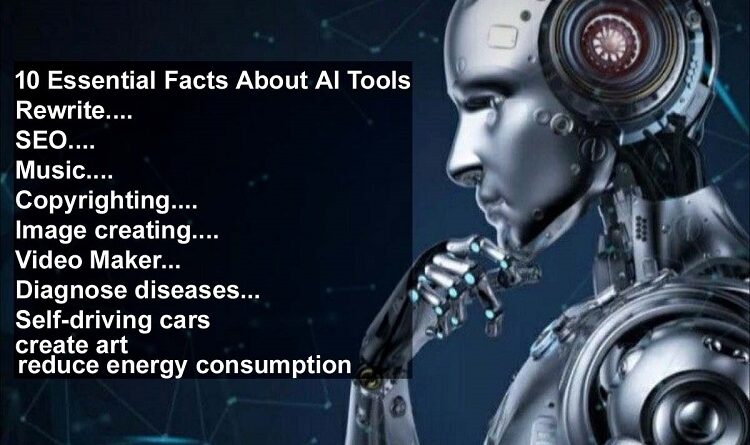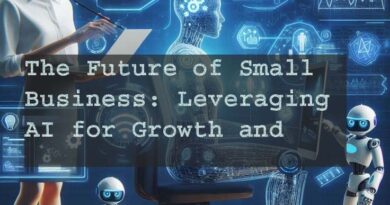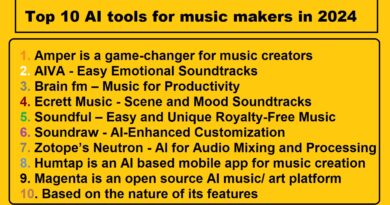10 Essential Facts About AI Tools
Essential Facts About AI
AI can perform SEO task
AI can be used copyrighting.
AI has been around for decades.
AI is already all around us.
AI can be used to diagnose diseases.
AI can be used for natural language processing.
AI can be used for facial recognition.
AI can help reduce energy consumption.
AI can create art.
AI is being used to develop self-driving cars.
Introduction to the concepts and prospects of AI and its role in redesigning the future.
These days, Essential Facts About AI, or Artificial Intelligence, has become a big player in all walks of life. AI proves very versatile and it has demonstrated the capability to improve our lives through things like self-driving cars and virtual personal assistants.
This is a blog where we explore some cool facts about AI. We will talk about how AI can change our future.
The writing tools have traveled a long way in the past several years, changing from simple spell-checkers to full-blown AI helpers that could solve your problem grammar and editing tasks.
Grammarly is a software that uses powerful Essential Facts About AI algorithms to find the flaws in your work and sing advice on how to improve it. It will be able to detect plagiarism by comparing the material with millions of documents on the net.
Copyrighting AI: Promoting intellectual property rights (IPR).
In addition to that, the copyright of AI is something worth exploring as a new aspect of artificial intelligence which has a potential to transform the way copyright is protected in the digital format. technology employs machine based learning algorithms to discover the computerized violation of copyrighted material on the internet and to sue for IP infringement those who are engaged in this activity. The technology deployed for the same purpose can also provide copyright holders an edge against illegal downloads of copyrighted material including movies and music files, therefore making the protection process easier.
SEO: Search Engine Optimizing (SEO) Content
SEO Search Engine Optimization has turned into a real vital instrument for those who want their sites to bring more traffic from search engines such as Google. By optimizing the web pages using the relevant keywords on a topic concerning the audience, the web pages will have a high-ranking position on search engine result pages (SERPs). Luckily, there are some Essential Facts About AI powered tools out there now which could efficiently restructure your content using the least knowledge of SEO concepts and algorithms.
AI impact on jobs and economy.
Artificial Intelligence has emerged as a breakthrough technology that is revolutionizing the world. AI applications range from humanized writing tools to copyrighting Essential Facts About AI–its impact on future jobs and economy being one of the biggest problems is what type of it will have. undefined
1. The possibilities of job losses.
Artificial Intelligence (AI) is forecasted by some experts to cause around 40% of world labor force to be replaced by automation by 2025. This might result into a remarkable amount of people being dismissed from their jobs in many industries such as retail and production.
2. Automation Affecting The Jobs Requiring Low Skills The Hardest.
It seems that low skilled and low wage tasks are more susceptible to automation than the others as they comprise comparatively simpler tasks which can be easily programmed into machines. This could deprive many people of work and they would find themselves fighting with the rest to get any kind of job elsewhere where new positions become more difficult to find.
3. The Increasing need of Hi-Tech jobs
The number of employees in manual labor will decrease when machines take over that work, which will lead to a demand for workers who have high-tech skills such as programming or data analysis. This could make a certain high-tech area even more competitive than it already is, so it will be more difficult for people without those specific skill sets to get jobs in this fields.
4. Advantages of SEO over AI
AI can also be useful in terms of search engine optimization (SEO). One of the examples of that is automated writing tools that may help marketers to write the content more optimized in a shorter period than ever before and Natural Language Processing (NLP) algorithms which may help to uncover the valuable insights about search engine trends to increase the visibility of the site in search results pages.
5. More customized shopping experiences.
AI is also changing online shopping, allowing eCommerce websites to use predictive analytics to show customers more personalized shopping experiences based on their behaviors when they are online or their past purchase history. This helps to build customer loyalty and increase sales but also provides businesses with the information on customer preferences and shopping behaviors to employ them in their marketing strategies refinement.
6. Specific Ads Becoming More Smarter
Nowadays with the growing popularity of programmatic advertising platforms, including Google Ads and Facebook Ads, marketing companies started using AI algorithms like machine learning or natural language processing to easily make specific ads (highly targeted) that are based on consumers’ interests or their online behavior.
7. Automation Streamlining Processes
Automation is soon taking over different functions across different industries including RPA technology to deal with back-office operations at banks, voice recognition systems for software companies, robots in warehouses, administrative processes in health care facilities and so much more. Now due to the availability of automated tools, companies have are able to save both time and money which always before was not possible with only conventional methods.
Understanding Automated Intelligence
Facts about AI automated intelligence reveal that this rapidly evolving technology is reshaping industries worldwide. Automated intelligence, commonly referred to as artificial intelligence (AI), involves machines designed to perform tasks that normally require human intelligence. With a comprehensive artificial intelligence background, we see its roots tracing back to the mid-20th century, evolving dramatically over the decades.
Historical Context
The concept of yapay zdka, or artificial intelligence, has been around since the 1950s. However, it wasn’t until the advent of machine learning and neural networks in the 1980s that AI began to realize its potential.
Core Technologies
Key technologies underpinning AI include machine learning (ML), natural language processing (NLP), and computer vision.
Real-World Applications
Automated intelligence is now integrated into various sectors such as healthcare, finance, and transportation. For example, in healthcare, AI assists in diagnosing diseases and personalizing treatment plans, while in finance, it helps in fraud detection and investment predictions.
Ethical Considerations
With the rise of AI, ethical considerations have become paramount. Issues such as data privacy, bias in automated decisions, and the potential for job displacement are critical discussions in the field of artificial intelligence.
Future Prospects
Looking ahead, the potential of yapay zdka continues to expand. Innovations such as quantum computing and advanced robotics promise to push the boundaries of what AI can achieve. Facts about AI automated intelligence highlight its transformative impact on society.
Fact 1: AI’s Role in Daily Life
Facts about AI automated intelligence reveal that artificial intelligence has seamlessly integrated into our daily routines, making our lives easier and more efficient.
Smart Assistants
One of the most visible implementations of AI in daily life is through smart assistants like Siri, Alexa, and Google Assistant. These AI-driven tools can set reminders, control smart home devices, and answer queries, significantly enhancing convenience.
Personalized Recommendations
AI algorithms analyze our preferences and behaviors to offer personalized recommendations. Whether it’s suggesting a new series on Netflix based on your viewing history or recommending products on Amazon, AI helps tailor experiences to individual needs.
Healthcare and Fitness
AI’s role extends to our health and well-being. Apps that track physical activity, sleep patterns, and dietary habits utilize AI to provide personalized health insights. Advanced AI systems also aid in diagnosing diseases and suggesting treatment plans.
Transportation
Services like Google Maps use AI to provide real-time traffic updates and route suggestions. Autonomous vehicles, although still in development, are another groundbreaking application of AI in this sector.
Communication
AI enhances communication by offering real-time translation services and automated responses. Tools like Grammarly use AI to check grammar and style, improving the quality of written communication.
Fact 2: The Impact of AI on Various Industries
From healthcare to finance, and retail to manufacturing, AI is not just a futuristic concept but a functional component in today’s business operations.
AI in Healthcare
Automated intelligence systems analyze vast amounts of medical data to predict disease outbreaks, assist in early diagnosis, and customize patient care, thus transforming traditional medical practices.
AI in Finance
The finance sector benefits from AI through improved fraud detection, risk management, and customer service. Automated intelligence applications in banking analyze transaction patterns to prevent fraud and provide personalized financial advice, thereby increasing operational efficiency and customer satisfaction.
AI in Retail
AI is reshaping the retail landscape by optimizing supply chains and enhancing customer experiences. Automated intelligence tools predict inventory needs, personalize shopping experiences through recommendation engines, and streamline logistics, ensuring products reach consumers efficiently.
AI in Manufacturing
In manufacturing, AI-driven automation is improving production processes and maintenance cycles. Automated intelligence systems monitor machinery for predictive maintenance, reducing downtime and enhancing productivity, while also ensuring quality control through real-time data analysis.
AI in Transportation
The transportation industry leverages AI for route optimization, autonomous vehicles, and traffic management. Automated intelligence enhances logistics by predicting the best routes, reducing fuel consumption, and improving delivery times, contributing to a more efficient transport system.
AI in Customer Service
Customer service sectors are rapidly adopting AI through chatbots and virtual assistants. Automated intelligence enhances customer interactions by providing 24/7 support, resolving inquiries quickly, and improving overall customer experience, which is essential in today’s digital age.




